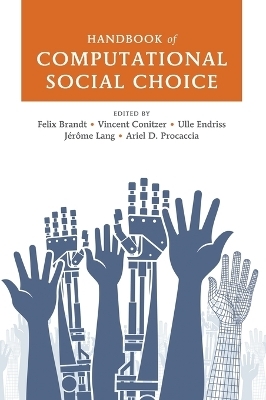
Handbook of Computational Social Choice
Cambridge University Press (Verlag)
978-1-107-06043-2 (ISBN)
The rapidly growing field of computational social choice, at the intersection of computer science and economics, deals with the computational aspects of collective decision making. This handbook, written by thirty-six prominent members of the computational social choice community, covers the field comprehensively. Chapters devoted to each of the field's major themes offer detailed introductions. Topics include voting theory (such as the computational complexity of winner determination and manipulation in elections), fair allocation (such as algorithms for dividing divisible and indivisible goods), coalition formation (such as matching and hedonic games), and many more. Graduate students, researchers, and professionals in computer science, economics, mathematics, political science, and philosophy will benefit from this accessible and self-contained book.
Felix Brandt is Professor of Computer Science and Professor of Mathematics at Technische Universität München. Vincent Conitzer is the Kimberly J. Jenkins University Professor of New Technologies and Professor of Computer Science, Professor of Economics, and Professor of Philosophy at Duke University. Ulle Endriss is Associate Professor of Logic and Artificial Intelligence at the Institute for Logic, Language and Computation at the University of Amsterdam. Jérôme Lang is a senior researcher in computer science at CNRS-LAMSADE, Université Paris-Dauphine. Ariel D. Procaccia is Assistant Professor of Computer Science at Carnegie Mellon University.
Foreword Hervé Moulin; 1. Introduction to computational social choice Felix Brandt, Vincent Conitzer, Ulle Endriss, Jérôme Lang and Ariel D. Procaccia; Part I. Voting: 2. Introduction to the theory of voting William S. Zwicker; 3. Tournament solutions Felix Brandt, Markus Brill and Paul Harrenstein; 4. Weighted tournament solutions Felix Fischer, Olivier Hudry and Rolf Niedermeier; 5. Dodgson's rule and Young's rule Ioannis Caragiannis, Edith Hemaspaandra and Lane A. Hemaspaandra; 6. Barriers to manipulation in voting Vincent Conitzer and Toby Walsh; 7. Control and bribery in voting Piotr Faliszewski and Jörg Rothe; 8. Rationalizations of voting rules Edith Elkind and Arkadii Slinko; 9. Voting in combinatorial domains Jérôme Lang and Lirong Xia; 10. Incomplete information and communication in voting Craig Boutilier and Jeffrey S. Rosenschein; Part II. Fair Allocation: 11. Introduction to the theory of fair allocation William Thomson; 12. Fair allocation of indivisible goods Sylvain Bouveret, Yann Chevaleyre and Nicolas Maudet; 13. Cake cutting algorithms Ariel D. Procaccia; Part III. Coalition Formation: 14. Matching under preferences Bettina Klaus, David F. Manlove and Francesca Rossi; 15. Hedonic games Haris Aziz and Rahul Savani; 16. Weighted voting games Georgios Chalkiadakis and Michael Wooldridge; Part IV. Additional Topics: 17. Judgment aggregation Ulle Endriss; 18. The axiomatic approach and the internet Moshe Tennenholtz and Aviv Zohar; 19. Knockout tournaments Virginia Vassilevska-Williams.
| Erscheint lt. Verlag | 25.4.2016 |
|---|---|
| Zusatzinfo | 9 Tables, black and white; 41 Line drawings, unspecified |
| Verlagsort | Cambridge |
| Sprache | englisch |
| Maße | 180 x 260 mm |
| Gewicht | 1150 g |
| Themenwelt | Informatik ► Theorie / Studium ► Künstliche Intelligenz / Robotik |
| Wirtschaft ► Volkswirtschaftslehre ► Ökonometrie | |
| ISBN-10 | 1-107-06043-5 / 1107060435 |
| ISBN-13 | 978-1-107-06043-2 / 9781107060432 |
| Zustand | Neuware |
| Haben Sie eine Frage zum Produkt? |
aus dem Bereich


